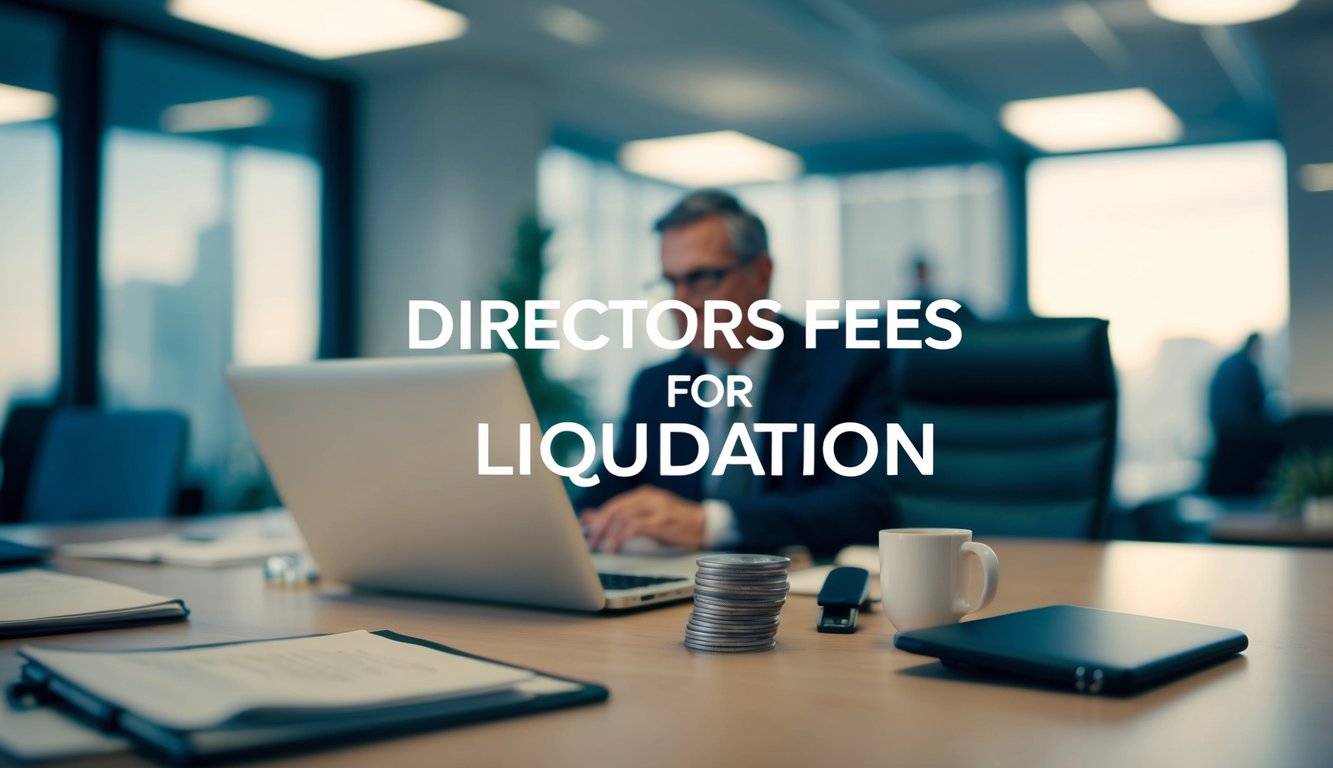Directors Fees for Liquidation: Essential Guidelines for Insolvent Companies
Overview of Directors’ Fees in Liquidation
Just for clarity! Directors do not typically receive fees during company liquidation… Your role as a director effectively ends when the liquidation process begins, and the liquidator takes control of the company’s affairs.
During liquidation, you are not usually personally liable for the liquidator’s fees. These fees are paid from the company’s remaining assets before distributions to creditors.
You must be aware that if you’ve taken excessive director’s fees or dividends before liquidation, especially when the company was insolvent, the liquidator can investigate these payments. They may require you to repay these amounts back to the company.
The liquidator will examine your past remuneration as part of their investigation into the company’s affairs. Any unreasonable or unauthorised payments could lead to personal liability.
Key restrictions after liquidation:
- You cannot be a director of any public company for 5 years
- You cannot use the same or similar company name for 5 years
- Your previous director’s salary and benefits stop immediately
If you’ve provided personal guarantees for company debts, these remain your responsibility despite the liquidation process. You’ll need to address these separately from the company’s liquidation.
Free Consultation – advice@andersonbrookes.co.uk or call on 0800 1804 935 our freephone number (including from mobiles).
Google Reviews

Legal Framework Governing Directors’ Fees During Liquidation
Directors’ fees during liquidation are subject to strict legal controls and company-specific regulations that protect creditors’ interests whilst ensuring fair compensation for necessary directorial duties.
Statutory Provisions
The Insolvency Act 1986 establishes the primary legal framework for directors’ remuneration during liquidation. Your rights to fees become significantly restricted once liquidation proceedings begin.
Directors cannot automatically draw their usual salary or fees during liquidation. The liquidator must approve any payments to directors.
If you continue to perform essential duties during liquidation, you must document these activities meticulously to justify any fee requests.
The law requires that creditors’ interests take priority over directors’ remuneration claims. Your fees will rank below secured creditors and liquidators’ costs in the payment hierarchy.
Company Policies on Liquidation and Directors’ Remuneration
Your company’s articles of association and service agreements play a crucial role in determining fee entitlements during liquidation.
Pre-existing service contracts may be terminated or modified by the liquidator if deemed necessary for the company’s orderly winding up.
You must review your director’s service agreement carefully, as it may contain specific provisions about remuneration during insolvency proceedings.
Many companies establish specific policies for directors’ fees during financial distress. These policies typically outline:
- Reduced fee structures
- Performance-related adjustments
- Payment timing restrictions
- Documentation requirements
Calculation of Directors’ Fees
Directors’ fees in liquidation scenarios are determined through specific calculations based on company assets, time invested, and statutory guidelines. The fee structure must be transparent and approved by creditors or their appointed committees.
Fixed Fees vs. Variable Compensation
Fixed fees provide a clear, predetermined amount for standard liquidation procedures. You’ll typically see these fees ranging from £4,000 to £7,500 for straightforward cases with minimal complexities.
Variable fees are calculated based on time spent, often charged at hourly rates that reflect the director’s expertise and responsibilities. These rates must be documented and justified to creditors.
Liquidators must present detailed time records showing:
- Hours worked on specific tasks
- Staff members involved
- Individual hourly rates
- Task descriptions and outcomes
Factors Influencing Fee Calculations
The size and complexity of your company directly impact fee calculations. Asset values, number of creditors, and required investigations all affect the final costs.
Key elements that determine fees include:
- Company asset value
- Number of creditors to manage
- Complexity of asset realisation
- Required statutory meetings
- Staff time allocation
Your company’s financial position plays a crucial role. If assets are available, fees are typically paid from these resources. In cases where directors qualify for redundancy pay, these funds might cover liquidation costs.
The liquidation committee, when appointed, must approve all fee arrangements through formal voting procedures. This ensures transparency and fair compensation for services rendered.
Roles and Responsibilities of Directors During Liquidation
Directors maintain specific legal obligations and duties throughout the liquidation process, with strict requirements around protecting creditor interests and managing company assets appropriately.
Duties of Directors
You must prioritise creditor interests once insolvency becomes apparent or likely. This duty begins before formal liquidation procedures start.
You have a legal responsibility to preserve company assets and prevent their dissipation. This includes maintaining accurate records and documentation of all business transactions.
Your cooperation with the appointed liquidator is mandatory. You must provide all relevant company books, records and information when requested.
You cannot continue trading if you know the company cannot pay its debts, as this could result in personal liability for company debts.
Considerations for Fee Entitlement
Your entitlement to director fees may continue during liquidation, but specific conditions apply.
The liquidator must approve any payments of director fees during the process. These will be assessed based on the company’s financial position and available assets.
You may need to demonstrate that your ongoing involvement provides value to the liquidation process to justify fee payments.
Key restrictions apply:
- Fees must be reasonable and proportionate
- Payments cannot prejudice creditor interests
- Historical fee arrangements may be reviewed
- Outstanding fee claims join the queue of creditor claims
Free Consultation – advice@andersonbrookes.co.uk or call on 0800 1804 935 our freephone number (including from mobiles).
Impact of Liquidation on Directors’ Fees
During company liquidation, directors face significant changes to their financial compensation structure, with legal restrictions and creditor priorities affecting how and when they receive payment.
Fee Reductions and Adjustments
Your director’s fees typically cease when liquidation proceedings begin. Any outstanding salary or fee claims become unsecured creditor claims against the company.
You must document all payments received in the months leading up to liquidation. The liquidator will scrutinise these transactions to ensure they were reasonable and justified.
If you’ve taken excessive fees before liquidation, the liquidator can demand repayment. This includes bonuses, dividends, or any payments deemed preferential or above market rates.
Payout Priority in Liquidation
Your outstanding director’s fees rank as unsecured claims in the payment hierarchy. This means you’ll only receive payment after secured creditors and preferential creditors are paid in full.
You can claim up to £800 in unpaid wages as a preferential debt. Any remaining salary or fee claims join the pool of unsecured creditors.
The liquidator must verify all fee claims before approval. You’ll need to provide evidence of agreed compensation terms and any unpaid amounts.
Payment of your claims depends on available assets after liquidation costs. In many cases, unsecured creditors receive only a small percentage of their total claim, if anything at all.
Procedures for Disbursing Directors’ Fees
Directors’ fees during liquidation follow strict regulatory guidelines and standardised payment processes, with clear mechanisms in place to handle potential disputes between parties.
Payment Process
The disbursement of directors’ fees requires proper documentation and approval from creditors through formal meetings. You must submit detailed time records and expense reports to justify any fee claims.
The liquidator will review your fee requests against company assets and available funds. Priority of payments follows a structured hierarchy, with secured creditors typically receiving first consideration.
Your fees will be processed through the liquidator’s office, with payments made via bank transfer or company cheque. Standard payment terms are typically 30 days from approval.
Potential Disputes and Resolutions
Fee disputes often arise when creditors challenge the amount or timing of directors’ fee payments. You have the right to appeal decisions through formal channels.
The resolution process typically involves:
- Mediation with creditors
- Review by an independent assessor
- Court proceedings as a last resort
Documentation plays a crucial role in resolving disputes. You must maintain detailed records of:
- Time spent on company matters
- Meeting attendance
- Business-related expenses
- Communications with stakeholders
Dispute resolution timeframes typically range from 2-8 weeks, depending on complexity and chosen resolution method.

Tax Implications on Directors’ Fees in Liquidation
Directors’ fees during liquidation are subject to Income Tax and National Insurance contributions through PAYE, just like regular salary payments.
When your company enters liquidation, any outstanding directors’ fees become a preferential claim against the company’s assets. This means they rank higher in priority compared to unsecured creditors.
You must declare all directors’ fees on your Self Assessment tax return. The tax rate applies according to your total income for the tax year, with rates ranging from 20% to 45%.
If you receive a lump sum payment for unpaid directors’ fees during liquidation, this could push you into a higher tax bracket for that year. Consider timing these payments carefully to manage your tax liability.
Key tax considerations:
- PAYE and National Insurance must be deducted at source
- Fees count towards your personal allowance
- Payments over £25,000 face full Income Tax liability
- Tax relief may be available for certain claims
Any benefits-in-kind you receive during the liquidation period remain taxable. These must be reported on form P11D and will be subject to both Income Tax and National Insurance contributions.
Remember to keep detailed records of all payments received, as these will be scrutinised by both the liquidator and HMRC.
Frequently Asked Questions
Directors face specific legal obligations and financial considerations during company liquidation, including restrictions on their powers, remuneration rules, and requirements for asset disposal.
What are the implications for directors when a company enters liquidation?
When liquidation begins, your powers as a director immediately cease. The liquidator takes control of the company’s operations and assets.
You must hand over all company records, assets and documentation to the liquidator.
You have a legal duty to cooperate fully with the liquidator throughout the process.
What is the typical range of liquidation fees for a limited company in the UK?
Liquidation fees typically range from £4,000 to £15,000 for small to medium-sized companies.
The exact cost varies based on the complexity of the case and company size.
Professional fees make up the largest portion of liquidation costs.
Can directors receive remuneration during the liquidation process?
Directors cannot continue receiving their normal salary once liquidation begins.
You may claim for work done prior to the liquidation date if properly documented.
Any outstanding director loans become immediately payable to the company.
What factors influence the total cost of liquidating a company?
The size and complexity of the company’s asset portfolio affects liquidation costs.
The number of creditors and amount of debt impacts the administrative workload.
Geographic location and choice of insolvency practitioner can influence professional fees.
How does voluntary liquidation affect the financial responsibilities of directors?
You must cease all company trading activities unless authorised by the liquidator.
Personal guarantees for company debts remain enforceable after liquidation.
Directors may face personal liability if found guilty of wrongful trading.
What are the legal requirements for liquidating a company in the United Kingdom?
You must obtain shareholder approval through a special resolution.
A licensed insolvency practitioner must be appointed as liquidator.
All creditors must receive formal notice of the liquidation proceedings.
The company must file final accounts and closure documents with Companies House.



